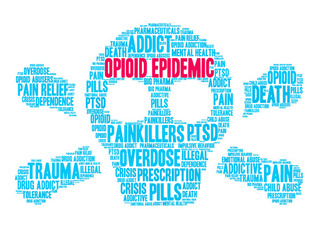Global AI in healthcare market expected to rise to $164B by 2030
The market size for 2023 was $10.31 billion
Read more... Overdose deaths from opioids increased 35% to nearly 76,000 in the 12-month period ending in April 2021, up from around 56,000 in the same period the year before. Most people will likely lay the blame on the pandemic, which caused an overall rise of substance abuse, but John Bowman, founder and CEO of Sure Med Compliance, a startup focused on curbing the opioid-related overdose epidemic, points to a different cause.
Overdose deaths from opioids increased 35% to nearly 76,000 in the 12-month period ending in April 2021, up from around 56,000 in the same period the year before. Most people will likely lay the blame on the pandemic, which caused an overall rise of substance abuse, but John Bowman, founder and CEO of Sure Med Compliance, a startup focused on curbing the opioid-related overdose epidemic, points to a different cause.
While he certainly acknowledges the negative effect the pandemic had on the overdose epidemic, he puts more blame on, "the cooling effect created by over zealous prosecutors, state boards, and civil litigator," which he believes have had a much greater influence on the rise in deaths.
"Since 2016, when the CDC’s Guideline for prescribing opioids was released (and rigidly interpreted) there has been an inverse relationship between the number of prescription opioids dispensed and the number of overdose deaths. Most would assume the opposite should have happened," he explained.
"This scenario is a direct result of patients having impeded access to pain management services, which has occurred because of over regulation of healthcare providers who treat pain. Therefore, patients with pain, dependence, and substance use disorders (all of which are true diagnoses) are left having their healthcare delivered by friends, family and sometimes drug dealers. They are inadvertently getting pills laced with illegally manufactured fentanyl and dying."
For example, to meet the medico-legal requirement for prescribing opioid therapy, a doctor must determine and document up to 26 pieces of patient data each time they issue a prescription. This is true for initiation and continuation. Some of these data points involve administering validated assessments, which can take five minutes each. On average, pain management doctors report that they spend less than 10 minutes with patients on medication management visits, which Bowman said makes meeting this standard "impossible."
This has led to a situation where illegally manufactured fentanyl now being responsible for over 70% of all overdose deaths, while prescription opioids are less than 10%.
Sure Med's solution is its electronic patient-reported outcome (ePRO) platform, called Perspectives in Care, which collects the majority of that required data from the patient, outside of the office, and reports it back to the physician, inside of the electronic health record, at the point of care, when the doctor is sitting with the patient.
"This accomplishes a few key benefits. One, it delivers meaningful mental and behavioral health data to help influence a safer prescribing decision. Two, it mitigates medicolegal risk to the provider by completing necessary chart documentation. This allows doctors to treat even the most challenging pain patients without fear of regulatory intervention," said Bowman.
The company wants to make Perspectives in Care into a national platform, which is why it announced a $1 million pre-series A round led by ProAssurance, a Birmingham-based medical professional liability company. The round also included $250,000 from a state grant awarded by Innovate Alabama.
"We couldn’t be more pleased that ProAssurance led this round. We have always believed that there was tremendous benefit for Medmal companies to promote this product. Having innovators like ProAssurance on our team will greatly help us reach our goal," said Bowman.
Founded in 2016, Sure Med Compliance works with patients, licensed pain management providers, and life sciences companies.
When patients are signed up, they receive a welcome letter from their doctor in the office, which explains the Perspectives in Care program and gives them instructions on how they can enroll and begin taking the evaluation. As the program is often considered a “condition of treatment,” patients must comply or seek treatment elsewhere.
Once logged in, patients can begin answering their periodic evaluations; this should be completed at some point, prior to their next office appointment, and it takes under 15 minutes to complete. Once the patient submits, their responses are scored, summarized and instantly delivered to the patient chart. This program is low-cost to the physician, due to Sure Med's ad-based revenue model that allows pharmaceutical, med device, and other life sciences companies to sponsor patients.
"This gives the healthcare enterprise the ability to place targeted banner ads at the bottom of the summary page that the physician reviews. We do not advertise to patients," Bowman explained.
In May of this year, Sure Med Compliance began a soft launch of their opioid therapy focused platform into several prolific pain groups across the US; so far, it has signed up what Bowman refers to as, "the two largest pain groups in the country," as well as several academic pain management groups. Once implemented, the company will have close to 300 clinics nationwide using its platform, which will represent close to 1 million patients. The company is also currently offering a lifetime membership to Perspectives in Care, completely free, to the first 250 clinics to sign up.
In its first NIH-funded clinical trial, the company found that its program reduced the amount of opioids actually prescribed and increased the amount of required data points in the patients chart, mitigating risk to the provider. It also found that patients reported an increase in physical function more often with Sure Med's program than with traditional collection methods.
"This data point is of higher value than most, simply because patients often catostrophize pain, making the visual analog scale (0-10) limited in its ability to show benefit of therapy. We are about to conclude our second trial and can share data once it’s published," said Bowman.
The company will use this investment and their partnership with ProAssurance, one of the largest medical malpractice providers in the country, to further scale their risk mitigation solution.
The start-up also has plans to create two new platforms to meet the needs of patients and providers in other disease states that commonly prescribe controlled substances, including orthopedic, acute care and addiction medicine.
"We will be adding needed personnel and making big software improvements including creating two new platforms, one for orthopedic/acute care and one for addiction medicine. We are also investing into a state-of-the-art advertising dashboard that allows us to scale faster. Lastly we will be partnering with some digital marketing firms to gain greater nationwide exposure," said Bowman.
The market size for 2023 was $10.31 billion
Read more...At Culture, Religion & Tech, take II in Miami on October 29, 2024
Read more...The company will use the funding to broaden the scope of its AI, including new administrative tasks
Read more...


